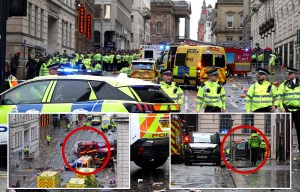The Yorkshire Ripper was tried for murder… so why not Valdo Calocane?

THE crimes of Valdo Calocane are among the darkest in British history.
But beyond his savagery that left three people dead on the streets of Nottingham last summer, what makes this case all the more shocking has been the woeful conduct of the authorities, which failed to tackle his escalating violence or impose the punishment his lethal brutality deserved.
His journey is a grim saga of negligence, incompetence and leniency which has denied justice to the families of his victims.
As one of the relatives said angrily after the conclusion of his case, which saw Calocane given an ultra-soft “indefinite hospital order”, he had literally “got away with murder”.
The sentence treats him not as a multiple killer who belongs behind bars for the rest of his life, but as a patient with a health condition needing taxpayer-funded support, medication and therapy.
‘Blood on his hands’
The offensive depths of this farce are illustrated by the outrageous prospect that over the next three years, if Calocane is deemed by the psychiatric experts to have recovered from his mental illness, then he could be released without even setting foot in prison.
READ MORE ON NOTTINGHAM KILLER
A legal system which fails to incarcerate a convicted multiple killer has descended into its own form of lunacy.
Yet the grotesque court proceedings are only one aspect of this sickening story.
Just as depressing was the catalogue of missed opportunities to deal effectively with Calocane before his rage exploded.
Emma Webber, whose son Barnaby was killed by Calocane, said the Assistant Chief Constable of the county, Rob Griffin, had “blood on his hands” because of his force’s mishandling of the case.
Most read in News
Such words were fully justified by the roll-call of failure by Griffin’s force.
Astonishingly, at the time of the killings, Calocane had no criminal record.
But the absence of any convictions was not a tribute to his law-abiding nature but to the police’s pathetic reluctance to challenge him.
As a mechanical engineering student, he had created his own reign of terror at Nottingham University since he had first been diagnosed as psychotic in May 2020, yet he never faced any consequences for his violent actions.
One female student was so frightened by him that she jumped from an upper window at her hall of residence, badly injuring herself in the process.
Four times he was detained under the Mental Health Act but quickly let go, even though he refused his medication and remained highly confrontational.
In September 2021, having been sectioned again, he was being taken by the police to a mental health unit when he attacked an officer.
Charged with assault, he failed to show up for his court hearing, so a warrant was put out for his arrest.
But the police made little attempt to find him, so the warrant was still in force at the time of his massacre.
The betrayal of justice continued once he was charged, particularly in the shameful decision by the Crown Prosecution Service to accept Calocane’s plea of guilty to manslaughter on the grounds of diminished responsibility because of his schizophrenia.
It was an incomprehensible decision, given that Calocane had clearly shown signs of intent as he plotted his mayhem, such as his stockpiling of weapons.
There was no need to go down this path. Justice, common sense and the rights of his victims demanded that this should have been a murder trial.
That would not have precluded medical treatment in a secure setting.
After all, the Yorkshire Ripper, Peter Sutcliffe, was tried for murder in 1981 despite four psychiatric reports that diagnosed him as a paranoid schizophrenic.
Like Calocane, Sutcliffe also declared that he heard voices in his head inciting him to kill.
But the judge, Sir Leslie Boreham, made of sterner stuff than Mr Justice Mike Turner, who took charge of Calocane’s case, refused to accept any claims of diminished responsibility on the grounds of mental illness and ordered that Sutcliffe be put in the dock before a jury on charges of murder.
Equally dismissive of the psychiatric excuse-making, the jury found him guilty on all counts.
As it turned out, Sutcliffe did a stretch in Broadmoor high security hospital before being transferred to HMP Frankland. But justice was done.
Some might argue that our society has become more tolerant and understanding of mental illness since 1981.
But it could equally be asserted that we have been increasingly enfeebled by the fashionable obsession with mental illness, which means that too many feckless or vicious people are now absolved of responsibility for their actions.
‘Moral collapse’
In fact, there is now an ugly tendency towards portraying all forms of criminal behaviour as a mental condition, with some experts maintaining that no less than 90 per cent of prisoners have mental disorders.
By putting all power in the hands of doctors and psychiatrists, this process of medicalising crime will ultimately destroy the concept of justice.
The state has lost its way in the fight against crime.
The police, once the most admired force in the world, now allow around 95 per cent of offences to go unpunished.
In the three years to March 2023, constabularies failed to solve a single burglary in half of all neighbourhoods in England and Wales.
Only four per cent of home burglaries resulted in prosecution, according to new Home Office figures.
As the prisons are gripped by turmoil and the legal system by paralysis, there is a tremendous sense of deepening moral collapse among the institutions that should be protecting the public.
Read More on The Sun
The furious reaction to the Calocane case should be a rallying call for change.
Heads should roll in the CPS and the police, paving the way for a new sense of purpose and a restoration of justice.












